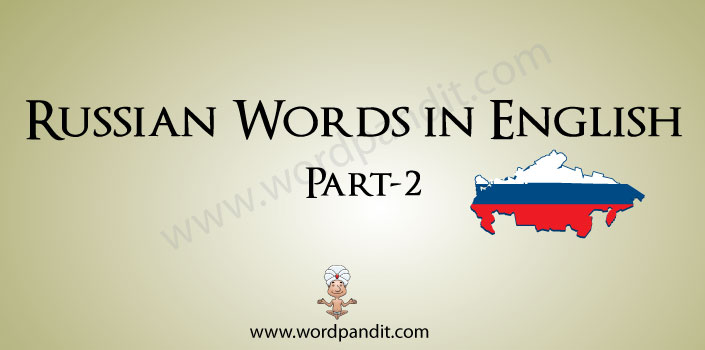Our first post in this series received huge response, so here we present you the second post in the same series. Well, I have to admit that writing the first post was fun. I was amazed at the influence of the Russian language on English, and I believe our users would have had a similar experience.
Now it is time to continue the same series and add a few more words with Russian antecedents to our dictionary. Dig in here:
1. Mammoth: Mammoth refers to a prehistoric mammal, and, by extension, is a synonym for the word massive. It comes from the Russian mam ( m ) ot (now mámont ), first used in reference to remains of the animal found in Siberia; origin uncertain
2. Perestroika: This is a super interesting word with a super interesting story. According to Wikipedia, it is defined as : ‘Perestroika was a political movement within the Communist Party of the Soviet Union during the 1980s, widely associated with the Soviet leader Mikhail Gorbachev along with his other major policy reform he introduced known as glasnost, meaning “openness”. Its literal meaning is “restructuring”, referring to the restructuring of the Soviet political and economic system.’
3. Pogrom: The word pogrom is one that finds its origin in the practices of the old Russian Empire, which mainly involved the massacre of Jews. Etymologically, pogrom (literally means destruction, devastation of a town, country etc.) is a derivative of progomit’m which breaks down to po- perfective prefix + gromít’ to destroy, devastate, derivative of grom thunder.
In the current context, pogrom means any officially sanctioned attack on a particular group. The most famous example of the 20th century of such an act is the pogrom carried out by Hitler against the Jews, one horrific act that just cannot be deleted from memory.
4. Politburo: Politburo (Russian politbyuró, shortening of politícheskoe byuró political bureau) is the executive committee for a number of communist political parties. Effectively, it is a truncation of the Russian forms of the words political and bureau.
5. Sable: Sable is a carnivorous mammal (Martes zibellina) of the weasel family that occurs chiefly in northern Asia. It is valued for the sleek fur which was used as a clothing material. The word is now used to refer to the color black/black clothing worn in mourning —usually used in plural. The etymology for this is a little confused but a rough inference about the same can be made. The fur of the sable is dark brown in color and in earlier times, this was dyed black before using it. So, maybe that’s why it is used to refer to the color black.
Read more about the animal here.
6.Samizdat: This word refers to the underground press and the literature produced by it. The word was used to refer to a clandestine publishing system within the Soviet Union, by which forbidden or un-publishable literature was reproduced and circulated privately.
7. Samovar: Samovar is a metal urn, used especially by Russians for heating water for making tea.
8. Sputnik: We all know what Sputnik-1 was. It was the first artificial satellite to be put into Earth’s orbit. Literally, in Russian, it stands for traveling companion, from s, so with + put’ path and now is used as a synonym for any objects placed by man in space.
9. Tzar/tsar/czar: This is the Russian name for the emperor of the state, this is what the ruler of the state was called. Since these rulers were in general autocratic, the word has a negative connotation now and is used to refer to people who are tyrants or autocrats. The meanings of the word in popular usage are as follows:
a. an emperor or king.
b. (often initial capital letter) the former emperor of Russia.
c. an autocratic ruler or leader.
d. any person exercising great authority or power in a particular field: a czar of industry.
10. Troika: Troika is another interesting word that carries multiple meanings. For one, it is referred to a Russian carriage or sleigh pulled by three horses. The three-factor spilled over and the word has the following meanings now:
a. A team of three horses abreast.
b. Triumvirate.
c. The cardinal number that is the sum of one and one and one
READ THE FIRDT POST IN THE SERIES HERE: RUSSIAN WORDS IN ENGLISH-1












These words are of no use.
hey nishant
you may have a point but i beg to differ from u
in fact these words are used in the political context and i remember some of these from my history books…like pogrom, perestroika and tzar/tsar.
so these have utility.
secondly, this post is not only about the utility of words but to showcase how the language has built up over a period of time..so that is the context of posting these words..
regards
Prashant
dear, Nishant
these words are so much of use in competitive exams like CLAT